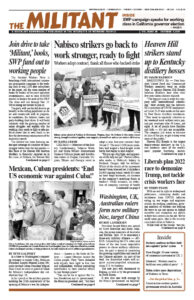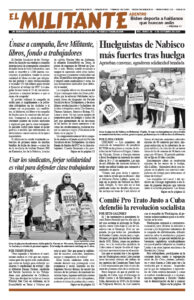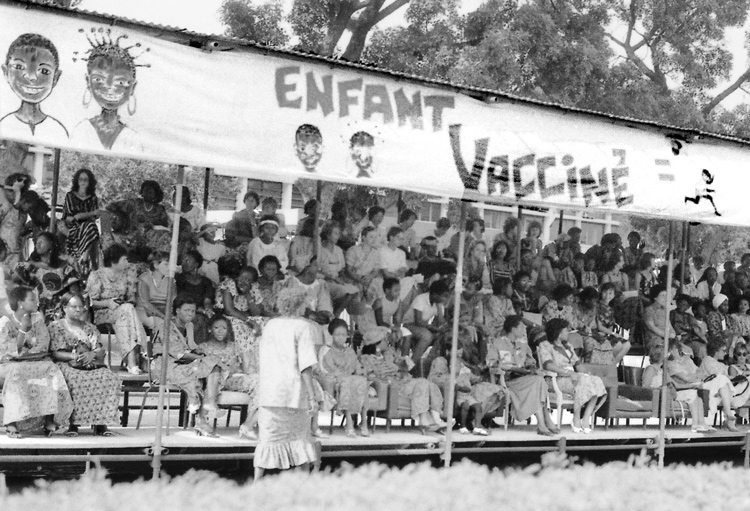The French edition of We Are Heirs of the World’s Revolutions: Speeches from the Burkina Faso Revolution 1983-87 by Thomas Sankara is one of Pathfinder’s Books of the Month for September. In August 1983 Sankara led an uprising in the former French colony of Upper Volta, bringing to power a popular revolutionary government, which organized workers, peasants, women and youth to take steps to seize control of their own destiny in one of the poorest countries in the world. Sankara was assassinated in a counterrevolutionary coup in October 1987. An outstanding communist, he set an example like Cuban revolutionary leaders Fidel Castro and Che Guevara, using the platform of the United Nations General Assembly on Oct. 4, 1984, to speak out for the oppressed and exploited of the world. That speech, “Freedom Must Be Conquered in Struggle,” is excerpted here. Copyright © 2007 by Pathfinder Press. Reprinted by permission.
BY THOMAS SANKARA
Mr. President:
I make no claim to lay out any doctrines here. I am neither a messiah nor a prophet. I possess no truths. My only aspiration is twofold: first, to be able to speak on behalf of my people, the people of Burkina Faso, in simple words, words that are clear and factual. And second, in my own way to also speak on behalf of the “great disinherited people of the world,” those who belong to the world so ironically christened the Third World. And to state, though I may not succeed in making them understood, the reasons for our revolt. …
This is what we glimpsed — we, the Burkinabé people — during the evening of August 4, 1983, when the first stars began to sparkle in the skies of our homeland. We had to take the leadership of the peasant revolts, signs of which were visible in a countryside that is panic-stricken by the advancing desert, exhausted by hunger and thirst, and abandoned. We had to give meaning to the brewing revolt of the idle urban masses, frustrated and weary of seeing limousines driving the elites around, elites that were out of touch, succeeding one another at the helm of state while offering the urban masses nothing but false solutions elaborated and conceived by the minds of others. We had to give an ideological soul to the just struggles of our popular masses as they mobilized against the monster of imperialism. The passing revolt, the simple brushfire, had to be replaced forever with the revolution, the permanent struggle against all forms of domination.
Others have explained before me, and others will explain after me, the extent to which the chasm has widened between the affluent peoples and those who aspire only to eat their fill, quench their thirst, survive, and preserve their dignity. But no one can imagine to what extent “the poor man’s grain” in our countries “has fattened the rich man’s cow”! …
I protest here on behalf of all those who vainly seek a forum in this world where they can make their voice heard and have it genuinely taken into consideration. Many have preceded me at this podium and others will follow. But only a few will make the decisions. Yet we are officially presented as being equals. Well, I am acting as spokesperson for all those who vainly seek a forum in this world where they can make themselves heard. So yes, I wish to speak on behalf of all “those left behind,” for “I am human, nothing that is human is alien to me.”
Our revolution in Burkina Faso embraces the misfortunes of all peoples. It also draws inspiration from all of man’s experiences since his first breath. We wish to be the heirs of all the world’s revolutions and all the liberation struggles of the peoples of the Third World. Our eyes are on the profound upheavals that have transformed the world. We draw the lessons of the American Revolution, the lessons of its victory over colonial domination and the consequences of that victory. We adopt as our own the affirmation of the Doctrine whereby Europeans must not intervene in American affairs, nor Americans in European affairs. Just as Monroe proclaimed “America to the Americans” in 1823, we echo this today by saying “Africa to the Africans,” “Burkina to the Burkinabé.”
The French Revolution of 1789, which overturned the foundations of absolutism, taught us the connection between the rights of man and the rights of peoples to liberty. The great revolution of October 1917 [in Russia] transformed the world, brought victory to the proletariat, shook the foundations of capitalism, and made possible the Paris Commune’s dreams of justice.
Open to all the winds of the will of the peoples of the world and their revolutions, having also learned from some terrible failures that led to tragic violations of human rights, we wish to retain only the core of purity from each revolution. This prevents us from becoming subservient to the realities of others, even when we share common ground because of our ideas.
Mr. President:
It is no longer possible to keep up the deception. The new international economic order for which we fight and will continue to fight can be achieved only if we succeed in destroying the old order that has ignored us; if we impose our rightful place in the political organization of the world; and if, conscious of our importance in the world, we obtain the right to participate in discussions and decisions on the mechanisms governing trade, the economy, and currencies on a global scale.
The new international economic order should simply be inscribed alongside all the other rights of the people — the right to independence, to the free choice of governmental forms and structures — like the right to development. And like all the peoples’ rights, it is conquered in struggle and by the struggle of the people. It will never be the result of an act of generosity from the powers that be.
I personally maintain unshakable confidence — a confidence shared by the immense community of Nonaligned countries — that, under the pounding blows of the howling anguish of our peoples, our group will maintain its cohesion, strengthen its collective bargaining power, find allies among all nations, and begin, together with those who can still hear us, to organize a genuinely new international system of economic relations.


